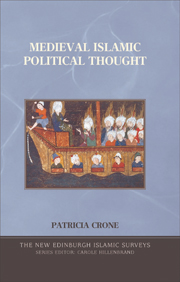Book contents
- Frontmatter
- Contents
- List of charts
- Preface
- Addenda and corrigenda
- I THE BEGINNINGS
- 1 THE ORIGINS OF GOVERNMENT
- 2 THE FIRST CIVIL WAR AND SECT FORMATION
- 3 THE UMAYYADS
- II THE WANING OF THE TRIBAL TRADITION, c. 700–900
- III COPING WITH A FRAGMENTED WORLD
- IV GOVERNMENT AND SOCIETY
- Charts
- Bibliography, abbreviations, and conventions
- Index and glossary
1 - THE ORIGINS OF GOVERNMENT
from I - THE BEGINNINGS
Published online by Cambridge University Press: 05 August 2013
- Frontmatter
- Contents
- List of charts
- Preface
- Addenda and corrigenda
- I THE BEGINNINGS
- 1 THE ORIGINS OF GOVERNMENT
- 2 THE FIRST CIVIL WAR AND SECT FORMATION
- 3 THE UMAYYADS
- II THE WANING OF THE TRIBAL TRADITION, c. 700–900
- III COPING WITH A FRAGMENTED WORLD
- IV GOVERNMENT AND SOCIETY
- Charts
- Bibliography, abbreviations, and conventions
- Index and glossary
Summary
How did medieval Muslims think that humans had come to live under government? Differently put, how did they explain the origin of the state? The short answer is that they did not normally see government as having developed at all, but rather as having existed from the start. It is worth examining this answer in greater detail, however, for it brings out some of the most basic assumptions behind their political thought. It is to such fundamental concepts and ideas that this chapter is devoted.
Terminology
The word ‘state’ in modern parlance refers sometimes to a set of governmental institutions which constitute the supreme political authority within a given territory (as when we grumble about the state and wish that it would wither away) and sometimes to a society endowed with such institutions, that is a politically organized society or polity (as in the expression ‘nation state’). In the question of how the state originated, the emphasis is on the agency, but the two meanings are closely related. Medieval Muslims had no word for states in either sense, however. They saw themselves as governed by persons rather than institutions and would speak of a ruler, such as a caliph (khalīfa) or king (malik), where we speak of the state in the first sense of the word; and they would identify the society of which the ruler was in charge as a nation (umma) or a religious community (milla), where we speak of states in the second sense of the word.
- Type
- Chapter
- Information
- Medieval Islamic Political Thought , pp. 3 - 16Publisher: Edinburgh University PressPrint publication year: 2004



